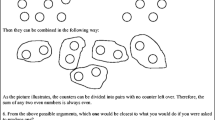Abstract
This study examines ways of approaching deductive reasoning of people involved in mathematics education and/or logic. The data source includes 21 individual semi-structured interviews. The data analysis reveals two different approaches. One approach refers to deductive reasoning as a systematic step-by-step manner for solving problems, both in mathematics and in other domains. The other approach emphasizes formal logic as the essence of the deductive inference, distinguishing between mathematics and other domains in the usability of deductive reasoning. The findings are interpreted in light of theory and practice.
Similar content being viewed by others
Notes
This is the classic approach to deductive reasoning, which is also adopted in this paper. There are also other approaches; the main one is based not on formal rules of inference but on manipulations of mental models representing situations (Johnson-Laird 1999).
When referring to non-mathematical situations the interviewees (of both approaches) did not differentiate among different domains. Instead, they talked in general terms and illustrated their claims with examples, usually from daily life situations. Some interviewees did refer to specific domains, like art, science, literature, and law in order to illustrate a general point. However, these references were not presented as specific to the referred domain. Rather, all examples were treated as instances of general principles, and no comparisons were made among the nature of logical rules in different domains.
References
Australian Education Council (1990). A national statement on mathematics for Australian schools. Carlton, Victoria: Curriculum Corporation.
Balacheff, N. (1988). ‘A study of students’ proving processes at the junior high school level’. Paper presented at the 66th Annual Meeting of the National Council of Teachers of Mathematics, Chicago, USA.
Cosmides, L., & Tooby, J. (1997). Evolutionary Psychology: A primer. http://philosophy.wisc.edu/shapiro/Phil553/EvPsych%20Primer.pdf.
Davis, P. J., & Hersh, R. (1981). The mathematical experience. Boston: Birkhäuser.
Duval, R. (1991). A cognitive analysis of problems of comprehension in a learning of mathematics. Educational Studies in Mathematics, 61, 103–131 doi:10.1007/s10649-006-0400-z.
Duval, R. (2002). ‘Proof understanding in mathematics’, Proceedings of 2002 International Conference on Mathematics: Understanding proving and proving to understand (pp. 23–44). National Taiwan Normal University. http://www.math.ntnu.edu.tw/~cyc/_private/mathedu/me1/me1_2002_1/duval.doc.
Fischbein, E., & Kedem, I. (1982). ‘Proof and certitude in the development of mathematical thinking’. In A. Vermandel (Ed.), Proceedings of the sixth international conference for the psychology of mathematics education (pp. 128–131). Antwerp: Universitaire Instelling Antwerpen.
Glaser, B. G., & Strauss, A. L. (1967). The discovery of grounded theory: Strategies for qualitative research. New York: Aldine.
Hanna, G. (1990). Some pedagogical aspects of proof. Interchange, 21(1), 6–13 doi:10.1007/BF01809605.
Hanna, G. (1996). ‘The ongoing value of proof’. In L. Puig & A. Gutiérrez (Eds.), Proceedings of the 20th conference of the international group for the psychology of mathematics education (pp. 21–35). Valencia, Spain.
Inhelder, B., & Piaget, J. (1958). The growth of logical thinking from childhood to adolescence: An essay on the construction of formal operational structures. London: Basic Books.
Israel Ministry of Education and Culture (1990). The mathematics curriculum in grades (pp. 7–9). Jerusalem: Israel Ministry of Education and Culture.
Johnson-Laird, P. N. (1999). Deductive reasoning. Annual Review of Psychology, 50, 109–135 http://arjournals.annualreviews.org/doi/abs/10.1146/annurev.psych.50.1.109.
Johnson-Laird, P. N., & Byrne, R. M. J. (1991). Deduction. Hillsdale, NJ: Erlbaum.
Krummheuer, G. (1995). ‘The ethnography of argumentation’. In P. Cobb & H. Bauersfeld (Eds.), The emergence of mathematical meaning: Interaction in classroom cultures (pp. 229–269). Hillsdale, NJ: Erlbaum.
Leron, U. (2003). Origins of mathematical thinking: A synthesis. http://www.dm.unipi.it/~didattica/CERME3/proceedings/Groups/TG1/TG1_leron_cerme3.pdf.
Leron, U. (2004). Mathematical thinking and human nature: Consonance and conflict. http://edu.technion.ac.il/Faculty/uril/Papers/Leron_ESM_%20Human_Nature.pdf.
Luria, A. R. (1976). Cognitive development: Its cultural and social foundations. Cambridge, MA: Harvard University Press.
Mariotti, M. A. (2006). ‘Proof and proving in mathematics education’. In A. Gutiérrez & P. Boero (Eds.), Handbook of research on the psychology of mathematics education (pp. 173–203). Rotterdam: Sense.
National Council of Teachers of Mathematics (1989). Curriculum and evaluation standards for school mathematics. Reston, VA: National Council of Teachers of Mathematics.
National Council of Teachers of Mathematics (2000). Principles and standards for school mathematics. Reston, VA: National Council of Teachers of Mathematics.
Pedemonte, B. (2007). How can the relationships between argumentation and proof be analysed? Educational Studies in Mathematics, 66, 23–41 doi:10.1007/s10649-006-9057-x.
Perelman, C., & Olbrechts-Tyteca, L. (1969). The new rhetoric: A treatise on argumentation. Notre Dame, IN: University of Notre Dame Press.
Polya, G. (1954). Induction and analogy in mathematics. Princeton, NJ: Princeton University Press.
Qualifications and Curriculum Authority (2006). National curriculum online. http://www.nc.uk.net/index.html.
Sabar Ben-Yehoshua, N. (2001). Genres and tradition in qualitative research. Lod: Dvir (in Hebrew).
Sainsbury, M. (1991). Logical forms: An introduction to philosophical logic. Oxford: Blackwell.
Strauss, A. (1987). Qualitative analysis for social scientists. Cambridge: Cambridge University Press.
Strauss, A., & Corbin, J. (1990). Basics of qualitative research: Grounded theory procedures and techniques. Thousand Oaks, CA: Sage.
The New Zealand Curriculum Framework (2001) http://www.tki.org.nz/r/maths/curriculum/statement/p8_e.php.
Toulmin, S. E. (1969). The uses of arguments. Cambridge: Cambridge University Press.
Wason, P. (1968). Reasoning about a rule. The Quarterly Journal of Experimental Psychology, 20, 273–281 doi:10.1080/14640746808400161.
Wu, H. (1996). The role of Euclidean geometry in high school. The Journal of Mathematical Behavior, 15, 221–237 doi:10.1016/S0732-3123(96)90002-4.
Yackel, E., & Hanna, G. (2003). ‘Reasoning and proof’. In J. Kilpatrick, W. G. Martin, & D. E. Schifter (Eds.), A research companion to principles and standards for school mathematics (pp. 227–236). Reston, VA: National Council of Teachers of Mathematics.
Acknowledgment
We would like to thank the Editor and the reviewers for their thoughtful comments on earlier versions of this paper.
Author information
Authors and Affiliations
Corresponding author
Rights and permissions
About this article
Cite this article
Ayalon, M., Even, R. Deductive reasoning: in the eye of the beholder. Educ Stud Math 69, 235–247 (2008). https://doi.org/10.1007/s10649-008-9136-2
Received:
Accepted:
Published:
Issue Date:
DOI: https://doi.org/10.1007/s10649-008-9136-2




